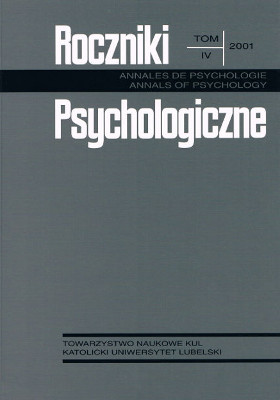Mechanisms of Events Ordering in Autobiographical Memory
Abstract
Autobiographical memory is a representation of events from one's personal past. A number of these events is great ant they occur in temporal order. The paper is an attempt to reconstruct psychological mechanisms responsible for ordering these events in memory. Four basic mechanisms of events ordering in autobiographical memory are considered. The first one consists in mechanical remembering of a sequence of events. Probably, it is rarely used, because it requires huge memory resources. The second mechanism refers to various time axes on which events are located. These axes possess units of different sizes. The smaller, unit the greater probability of error in location in time estimation. The third mechanism is based on a hierarchical organization of autobiographical memory – it assumes that information is registered within a hierarchical system. When you step from the general level to the concrete one, you are able to reconstruct a more precise order of events. The idea of the hierarchical organization of autobiographical memory proposed by Conway (1996) is used. The fourth group of mechanisms is based on cause-effect relationships. These events that are recognized as causes are considered as earlier than events considered as effects. An example of such mechanisms is inference based on actor-observer effect. Consequences of sequential ordering of representations in autobiographical memory for personal identity and continuity are finally discussed.
References
Aronson, E. (1997). Człowiek istota społeczna. Warszawa: Wydawnictwo Naukowe PWN.
Baddeley, A. (1993). Human memory. Theory and practice. Hillsdale: Lawrence Erlbaum.
Brewer, W. F. (1996). What is recollective memory? W: D. Rubin (red.), Remembering our past (s. 19-65). Cambridge: Cambridge University Press.
Brown, R., Kulik, J. (1977). Flashbulb memories. Cognition, 5, 73-99.
Christianson, S.-Å., Safer, M. A. (1996). Emotional events and emotions in autobiographical memories. W: D. Rubin (red.), Remembering our past (s. 218-243). Cambridge: Cambridge University Press.
Conway, M. (1996). Autobiographical knowledge and autobiographical memory. W: D. Rubin (red.), Remembering our past (s. 67-93). Cambridge: Cambridge University Press.
Dymkowski, M. (1996). Samowiedza w okowach przywdziewanych masek. Warszawa: Wydawnictwo Instytutu Psychologii PAN.
Eisen, S. V. (1979). Actor-observer differences in information inference and causal attributio. Journal of Personality and Social Psychology, 37, 261-272.
Flavell, J. H., Wellman, H. M. (1977). Metamemory. W: R. V. Kail, Jr., J. W. Hagen (red.), Perspectives on the development of memory and cognition (s. 3-33). Hillsdale: Lawrence Erlbaum.
Forward, S. Frazier, D. (1999). Szantaż emocjonalny. Gdańsk: Gdańskie Wydawnictwo Psychologiczne.
Friedman, W. J. (1993). Memory for the time of past events. Psychological Bulletin, 113, 44-66.
Heise, D. R., Calhan, C. (1995). Emotion norms in interpersonal events. Social Psychology Quarterly, 58, 223-240.
Ingram, J. (1996). Płonący dom. Warszawa: Prószyński i S-ka.
Jones, E. E., Nisbett, R. E. (1972). The actor and the observer: Divergent perceptions of causality. W: E. E. Jones i in. (red.), Attribution: Perceiving the causes of behavior (s. 79-94). Morristown: General Learning Press.
Langer, E. J. (1993). Problemy uświadamiania. Konsekwencje refleksyjności i bezrefleksyjności. W: T. Maruszewski (red.), Poznanie – afekt – zachowanie (s. 137-179). Warszawa: Wydawnictwo Naukowe PWN.
Larsen, S. F., Thompson, C. P., Hansen, T. (1996). Time in autobiographical memory. W: D. Rubin (red.), Remembering our past (s. 129-156). Cambridge: Cambridge University Press.
Linton, M. (1978). Real-world memory after six years. An in vivo study of very long-term memory. W: M. M. Gruneberg, P. E. Morris, R. N. Sykes (red.), Practical aspects of memory (s. 69-76). London: Academic Press.
Maruszewski, T. (1991). Human rationality – fact or idealizational assumption. W: E. Eells, T. Maruszewski (red.), Probability and rationality (s. 283-303). Amesterdam-Atlanta: Rodopi.
Maruszewski, T. (1996). Psychologia poznawcza. Warszawa: Polskie Towarzystwo Semiotyczne.
Maruszewski, T., Ścigała, E. (1998). Emocje – aleksytymia – poznanie. Poznań: Wydawnictwo Fundacji Humaniora.
Maruszewski, T., Stawiska, A. (2001). Pamięć po traumie. W: K. Popiołek (red.), Człowiek w sytuacji zagrożenia. Kryzysy, kataklizmy, katasrofy (s. 271-288). Poznań: SpiA.
Materska, M. (1997). Badania nad strukturą zapisu kolejności zdarzeń w pamięci autobiograficznej. Kolokwia Psychologiczne, 6, 85-96.
Neisser, U., Harsch, N. (1992). Phantom flashbulbs. False recollection of hearing the news about Challenger. W: E. Winograd, U. Neisser (red.), Affect and accuracy in recall. Studies of „flashbulb memories” (s. 9-31). Cambridge: Cambridge University Press.
Pligt, J. (1981). Actors' and observers' explanations: different perspectives or different evaluations. W: C. Antaki (red.), The psychology of ordinary explanations of social behavior (s. 97-118). London: Academic Press.
Ross, L., Green, D., House, P. (1977). The „false consensus effect”: and egocentric bias in social perception. Journal of Experimental Social Psychology, 13, 279-301.
Rubin, D. (1996). Introduction. W: D. Rubin (red.), Remembering our past (s. 1-19). Cambridge: Cambridge University Press.
Sacks, O. (1994). Mężczyzna, który pomylił swoją żonę z kapeluszem. Poznań: Zysk i S-ka.
Schacter, D. L. (1996). Searching for memory. The brain, the mind, the past. New York: Basic Books.
Woodworth, R. S., Schlosberg, H. (1963). Psychologia eksperymentalna. Warszawa: PWN.
Copyright (c) 2001 Roczniki Psychologiczne

This work is licensed under a Creative Commons Attribution-NonCommercial-NoDerivatives 4.0 International License.


